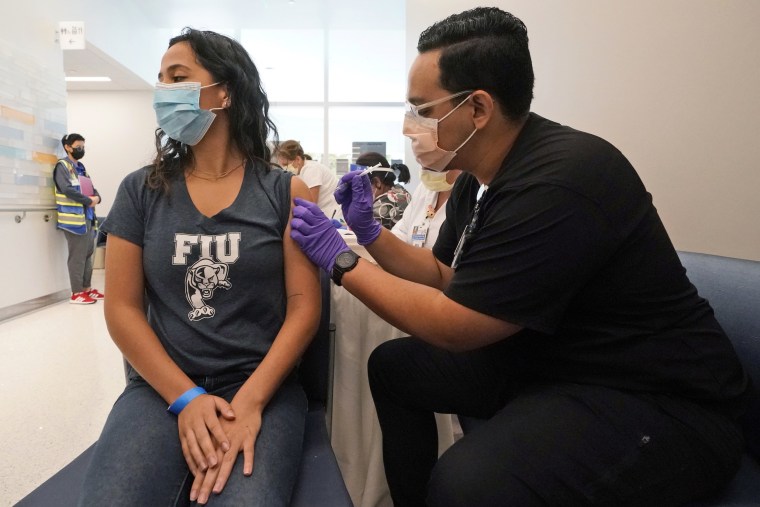A solid majority of U.S. Latinos say they plan to get the coronavirus vaccination or already have got it, which is a markedly different scenario from earlier in the year, when skepticism and mistrust were a much greater challenge.
This is great news, community leaders and Latino legislators say, but access to vaccinations continues to be a hurdle.
A survey by the Pew Research Center in Washington, D.C., finds that 70 percent of Latinos are planning to be vaccinated or have already received shots.
“If we are serious about addressing Covid -19 and its impacts — or any pandemics in the future — our response efforts cannot have a plan that ignores communities of color or immigrants,” Rep. Jesús “Chuy” García, D-Ill., said during a virtual summit this week that focused on addressing health disparities in Latino communities.
García and other members of the Congressional Hispanic Caucus are backing efforts to bring more vaccine doses to Latinos and other communities of color, and that includes introducing the Tri-Caucus Covid-19 Resolution, which aims to streamline vaccine access and work with community organizations to boost vaccinations. The Congressional Tri-Caucus is comprised of the Congressional Hispanic Caucus, the Congressional Black Caucus and the Asian Pacific American Caucus.
“Vaccine hesitancy remains an issue, but the reality is that access is an even bigger problem,” García said this week on the floor of the House. “We need to meet people where they are and bring vaccines to those who need it the most.”
Among other things, the resolution calls for implementing and monitoring plans for equitable distribution and allocation of Covid–19 vaccine doses, putting together outreach strategies with community organizations, making sure that vaccinations are not denied based on immigration status and establishing vaccination clinics in the hardest-hit industries. It will also encourage retail pharmacies to target ZIP codes with a disproportionate rate of infections and hospitalizations. April is National Minority Health Month.
“The Hispanic community continues to bear the brunt of the Covid-19 pandemic with high rates of infections, hospitalizations and deaths,” said Congressional Hispanic Caucus Chair Rep. Raúl Ruiz, D-Calif., a doctor. "Health inequities harm public health overall, and it is critical that Covid-19 vaccines are distributed according to health equity principles. Doing so will not only help stop the spread of Covid-19, but will help ensure critical economic, educational, and social activities resume,” he told NBC News.
One of the community groups working on greater vaccine access is the National Hispanic Medical Association, which last month launched the bilingual Vaccinate 4ALL/VacunasParaTodos to train people at the individual level and through social media to encourage vaccine participation. The program is also forming partnerships with Latino physicians and health care professionals, who are trusted sources of information in communities.
“This pandemic has taught us that we need many more doctors and nurses and dentists and pharmacists who are Latino,” said Dr. Elena Ríos, association president and CEO.
"Numbers aren't adding up"
Illinois Lt. Gov. Juliana Stratton, who spoke at the summit sponsored by the advocacy group The Puerto Rican Agenda of Chicago, said the pandemic "turned our world upside down," pointing to ongoing social and health inequities in Black and Latino communities.
“More than 8 million people have received a vaccine in the state of Illinois; 11 percent of those shots have gone to the Hispanic population while Hispanic people make up 17 percent of the state’s population," she said. “These numbers aren’t adding up and that is costing far too many lives.”
Marilyn Aguirre Molina, a professor and founder-director of the CUNY Institute of Health Equity in New York City, said the overrepresentation of Latinos and people of color in Covid-19 deaths and illnesses has forced a national awakening of the "elephant in the room — that your ZIP code is a greater determinant of health than your genetic code." This, she said, has not been a national health priority.
Aida Maisonet Giachello, a research professor at Northwestern University’s Feinberg School of Medicine, said that while a lot of attention has been given to Covid-19 for all the right reasons, Latinos have also experienced higher numbers of deaths from conditions not related to the coronavirus. The health care system, she said, didn't have the capacity to care for those who ended up in an emergency room who were not a priority during the pandemic.
“People living with cancer were not able to get cancer treatment, people who were diabetic were not getting the medicine, people with asthma, with cardiovascular and other conditions; it (the health care system) was not able to take care of them," she said.
While it's important to continue to address the challenges of Covid-19, Giachello said, it's important to balance the need for bilingual and bicultural care "that Latino patients deserve in order to manage their diverse conditions."
Follow NBC Latino on Facebook, Twitter and Instagram.
